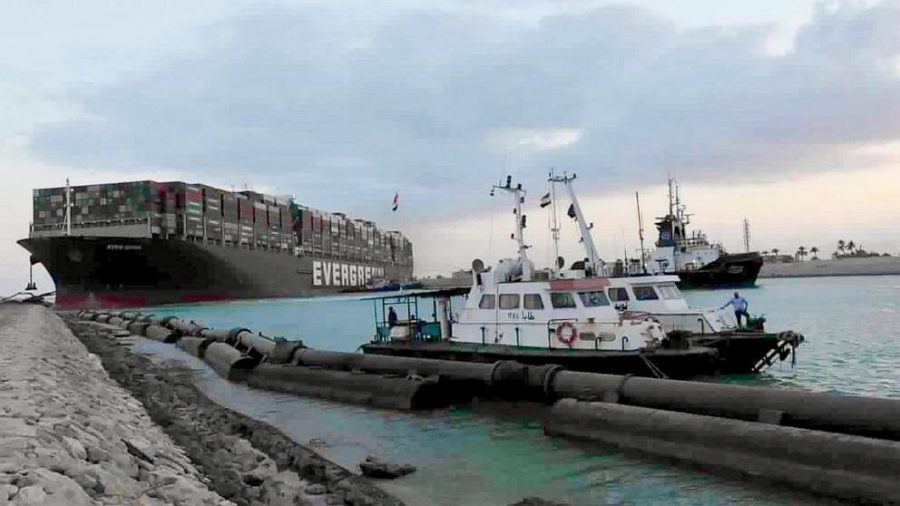The 1,300 foot long container ship Ever Given was finally freed last week after being stuck in the middle of Egypt’s Suez Canal for six days, leading to an investigation by maritime experts and naval engineers who were determined to learn what caused the ship to run aground and block the canal.
Experts conducted day-by-day research on what went wrong and what can be done in the future to stop similar accidents.
The Taiwanese ship, which was en route from the Port of Tanjung Pelepas, Malaysia, to the Port of Rotterdam, Netherlands, lost visibility when it was caught in a sandstorm.
According to CNN, the grounding was caused by “strong winds” which resulted in the “loss of the ability to steer the ship,” which in return caused the hull of the ship to turn towards the bank of the canal. The ship then ran aground just downstream from the town of Madama, blocking both directions of ship traffic, with 15 ships behind it.
Maritime technology experts told The Wall Street Journal that they believed the grounding was caused by the “bank effect,” which can cause the stern of a ship to swing toward the nearest bank when operating in a narrow waterway.
“Since most of the focus of modern ship design is directed towards efficiency and stability at sea, the effects of hydrodynamics in shallow waters, especially in light of the rapidly growing size of ships in the past decade, remain somewhat obscure and in need of further study,” the experts said.
The grounding of Ever Given caused over 300 ships attempting to traverse the Suez Canal to be blocked from passing through, essentially causing a marine traffic jam. Due to the Suez Canal being the main waterway for commercial trade between Europe, the Middle East and South and East Asia, maritime experts predicted that the blockage would have taken a massive commercial and economic toll globally, if the ship had not been freed.
According to CNBC, it was estimated that approximately $400 million worth of goods had been delayed per hour, and every day throughout the course of the six day period an additional $9 billion worth of goods were lost. The Suez Canal is also a major sector of the Egyptian economy, and Egypt was thought to have lost $12-14 million per day due to the closure.
The Suez Canal has been one of the most important waterways for commercial shipping in the world since its completion in 1859. According to Transport Talent, “about 10% of the world’s maritime trade travels through the Suez Canal.” Shipping through the canal also accounts for approximately 30% of Egypt’s economy.
There is also a long and turbulent history surrounding the Suez Canal. Ideas for a waterway between the Mediterranean Sea and Red Sea have existed as far back as the second millennium B.C., under the ancient Egyptian Pharaoh, Senusret II.
However, this construction was only able to link the Nile River to the Red Sea, which would not be able to sustain the size of seafaring cargo freighters used in the 19th century onwards. When the modern canal was constructed in 1859, it was considered property of the Egyptian government, but was primarily operated by British and French shareholders, as Egypt was a British territory until 1952.
In 1952, the British-loyalist government under King Farouk was overthrown in a coup d’état by Arab-nationalist forces led by Gamal Abdel Nasser. Nasser would then become president of Egypt under the new government, and the canal was nationalized per his orders.
This led to the Suez Crisis of 1956, a short war between Egypt and the British and French, who were allied with the newly-formed neighboring state of Israel. Their intentions were to restore European control of the canal, overthrow Nasser and hand the Sinai Peninsula east of the canal to Israel.
The war waged for one week and two days, and resulted in hundreds of casualties on the British/French/Israeli side, and thousands of casualties on the Egyptian side. However, Egypt was able to maintain control of the Suez Canal, while Israel was able to occupy the Sinai Peninsula until 1957.
The British and French would eventually pull out of Egypt after immense political pressure from both the United States and the Soviet Union, and both British Prime Minister Anthony Eden and the French President René Coty were considered failures in their home countries. This also marked the demise of Britain’s role as a global superpower.
Due to both the historical and current significance of the canal, the Suez Canal Authority knew they had to act fast to free the grounded ship, before global economic chaos ensued. According to Al Jazeera, “the Suez Canal Authority suspended navigation through the canal” on March 25 until the Ever Given could be refloated. The same day, Egyptian President Abdel Fattah el-Sisi’s adviser on seaports stated that he “expected the canal to be cleared within 48 to 72 hours, maximum.” On March 26, the Suez Canal Authority began dredging around the ship, along with support from Italian and Dutch tugboats.
The ship was finally freed on March 29 at 4:30 p.m. Egyptian Time, after a search of the ground of the Suez Canal had found it was sound and had no issues. According to Almal News, the blockage of the canal had caused “more than 400 ships” to be stalled on both sides of the canal. These ships were finally able to resume their journey through the canal once Ever Given had been freed.
According to Business Insider, Ever Given is currently moored in the Great Bitter Lake in the middle of the canal, waiting for an inspection, so that it can continue its voyage.






